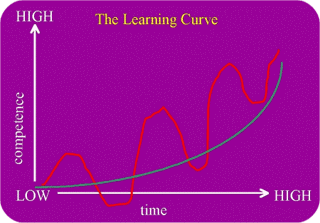Thursday 19 May, 2005
If you really, truly want your staff to be creative,
motivated and happy - tell them you want them to make mistakes. Tell
them you'll punish them if they don't.
There's the story about a top salesman in the aircraft industry
who messed up. He lost a $5,000,000 contract. At his desk the next
morning he starts going through his papers - tidying them up, clearing
his desk. He gets a phone call from his manager, "Have you got 5
minutes?" "Sure" he mumbles and slowly makes his way up the stairs to
his boss' office. As he enters the room he says "Look I know I got it
wrong - I'm sorry - I've written my letter of resignation - here it is"
and puts it on the desk. His manager looks at the letter, rips it in
half, rips it in half again and puts it in the bin. "You must be joking"
she says smiling "We've just spent $5,000,000 on your training -
there's no way you're leaving until you've made that back for us."
Is this the way you and your Organisation deal with mistakes? It should be. If you don't then you're helping to create an environment of dishonesty, low risk taking and blame.
For example, I used to work as a computer programmer in an Organisation that 'didn't tolerate mistakes'. One day I accidentally printed out 2.4 million address labels incorrectly. For hours the messengers delivered these labels to me. They were piling up in the corner, then taking over the whole room, gradually moved toward me. Luckily (!) my manager never came in my room - ever. Everything was communicated by email. So what do you think I did? Did I say "Hey - sorry, got it wrong - let's hire a truck and recycle this paper" - I did not. I was putting a few hundred of these in the waste bin every day. It took months of effort for me to get rid of them all. Not really the most cost effective use of my time.
As a manager you know that people will make mistakes. You know that don't you? Really! You also know that the biggest learning comes from the biggest mistakes. Think of the biggest learning experience you've had - something memorable. I would bet all the money in my pocket that it's not some wonderful experience when things worked beautifully. For me it's the time I crashed the car. I'll never forget that experience. It was 12 years ago, but to this day I always look right when turning left at a junction.
So, if you really, truly want your staff to be creative, motivated and happy - tell them you want them to make mistakes. Tell them you'll punish them if they don't. Give them targets of how many mistakes they must make in a week and if they make more - give them a bonus. Trust them.
Some of the greatest products have come from mistakes: the original postit note was made from a batch of glue that didn't stick, play-doh was designed as a wallpaper cleaner.
But it's vital that when people make mistakes you deal with it as an adult. Look at what happened, calmly. Find out what went wrong, non-blamefully. Make sure everyone learns from it and it doesn't happen again.
Learning by definition, my definition at least, involves change. Otherwise why bother. This could be a change in attitude, behaviour, whatever, but at some level, a change.
At an organisational level, businesses need to change to survive. Reg Revons' formula L => C (where L is the rate of learning and C is the rate of change) is especially true today where the rate of change increases almost week by week. Organisations that don't change die. Think about it.
Encyclopaedia Britannica was once a thriving worldwide organisation. In 1990 sales were $650 million. Then the CD-ROM came along. They resisted. "It's a fad. People will always want to read our books" seemed to be their message. In May 1995 the company was put up for sale. No one wanted them. They were finally sold 18 months later for less than half the book value.
Success stories are from organisations that change and develop, take risks, make mistakes. Minnesota Mining and Manufacturing company started in 1902 mining for material for sandpaper. For the next 100 years they changed and developed - huge successes and huge failures - sandpaper, masking tape, magnetic tape, high tech products, everything now we associate with 3M.
Wells Fargo began 150 years ago as a stagecoach and messenger service and since then they've moved into insurance, banking and Internet banking with assets of over $300 billion.
Successful organisations change and develop when things are going well. They reward enterprise. They value mistakes. The Yamaha Motor Company held an exhibition on products that hadn't worked ("First Yamaha Challenge Exhibition"). Pride of place went to the $833,000 super car from 1982 that was never sold.
Show off your mistakes, evaluate them, laugh about them - then move on. I would disagree with the nice smooth learning curve (green line) For me life is more like the red line - big failures followed by great learning and bigger successes. Take pride in your failure.
If your staff do everything they can to succeed but fail - reward them. If they genuinely cock-up because they've tried too hard praise them.
If they knock on your door and say "Guess what? I've just lost a contract because I really went with my gut reaction but got it wrong" put your arm around their shoulder, not their neck. You know the next time they'll be even keener to get it right. You know that, don't you? Trust them.
Is this the way you and your Organisation deal with mistakes? It should be. If you don't then you're helping to create an environment of dishonesty, low risk taking and blame.
For example, I used to work as a computer programmer in an Organisation that 'didn't tolerate mistakes'. One day I accidentally printed out 2.4 million address labels incorrectly. For hours the messengers delivered these labels to me. They were piling up in the corner, then taking over the whole room, gradually moved toward me. Luckily (!) my manager never came in my room - ever. Everything was communicated by email. So what do you think I did? Did I say "Hey - sorry, got it wrong - let's hire a truck and recycle this paper" - I did not. I was putting a few hundred of these in the waste bin every day. It took months of effort for me to get rid of them all. Not really the most cost effective use of my time.
As a manager you know that people will make mistakes. You know that don't you? Really! You also know that the biggest learning comes from the biggest mistakes. Think of the biggest learning experience you've had - something memorable. I would bet all the money in my pocket that it's not some wonderful experience when things worked beautifully. For me it's the time I crashed the car. I'll never forget that experience. It was 12 years ago, but to this day I always look right when turning left at a junction.
So, if you really, truly want your staff to be creative, motivated and happy - tell them you want them to make mistakes. Tell them you'll punish them if they don't. Give them targets of how many mistakes they must make in a week and if they make more - give them a bonus. Trust them.
Some of the greatest products have come from mistakes: the original postit note was made from a batch of glue that didn't stick, play-doh was designed as a wallpaper cleaner.
But it's vital that when people make mistakes you deal with it as an adult. Look at what happened, calmly. Find out what went wrong, non-blamefully. Make sure everyone learns from it and it doesn't happen again.
Learning by definition, my definition at least, involves change. Otherwise why bother. This could be a change in attitude, behaviour, whatever, but at some level, a change.
At an organisational level, businesses need to change to survive. Reg Revons' formula L => C (where L is the rate of learning and C is the rate of change) is especially true today where the rate of change increases almost week by week. Organisations that don't change die. Think about it.
Encyclopaedia Britannica was once a thriving worldwide organisation. In 1990 sales were $650 million. Then the CD-ROM came along. They resisted. "It's a fad. People will always want to read our books" seemed to be their message. In May 1995 the company was put up for sale. No one wanted them. They were finally sold 18 months later for less than half the book value.
Success stories are from organisations that change and develop, take risks, make mistakes. Minnesota Mining and Manufacturing company started in 1902 mining for material for sandpaper. For the next 100 years they changed and developed - huge successes and huge failures - sandpaper, masking tape, magnetic tape, high tech products, everything now we associate with 3M.
Wells Fargo began 150 years ago as a stagecoach and messenger service and since then they've moved into insurance, banking and Internet banking with assets of over $300 billion.
Successful organisations change and develop when things are going well. They reward enterprise. They value mistakes. The Yamaha Motor Company held an exhibition on products that hadn't worked ("First Yamaha Challenge Exhibition"). Pride of place went to the $833,000 super car from 1982 that was never sold.
Show off your mistakes, evaluate them, laugh about them - then move on. I would disagree with the nice smooth learning curve (green line) For me life is more like the red line - big failures followed by great learning and bigger successes. Take pride in your failure.
 |
If your staff do everything they can to succeed but fail - reward them. If they genuinely cock-up because they've tried too hard praise them.
If they knock on your door and say "Guess what? I've just lost a contract because I really went with my gut reaction but got it wrong" put your arm around their shoulder, not their neck. You know the next time they'll be even keener to get it right. You know that, don't you? Trust them.
Source:ceoonline.com

No comments:
Post a Comment